 One of Romania’s leading veteran filmmakers, Radu Gabrea’s four-decade career spans more than 20 features and documentaries. Many of them have examined Romania’s Communist history and the political and social challenges facing Jewish culture in central Europe. In the fall of 2011, he successfully inaugurated the Medias Central European Film Festival (MECEFF) in the Transylvanian town of Medias, and was prominently featured in a retrospective of contemporary Romanian cinema at New York’s Lincoln Center. This spring, he plans to organize several international events to promote the second edition of MECEFF (held September 2-8). Key among them a 2-day series of screenings and discussions centered on one of the themes of this year’s festival: Romanians in Hollywood.
One of Romania’s leading veteran filmmakers, Radu Gabrea’s four-decade career spans more than 20 features and documentaries. Many of them have examined Romania’s Communist history and the political and social challenges facing Jewish culture in central Europe. In the fall of 2011, he successfully inaugurated the Medias Central European Film Festival (MECEFF) in the Transylvanian town of Medias, and was prominently featured in a retrospective of contemporary Romanian cinema at New York’s Lincoln Center. This spring, he plans to organize several international events to promote the second edition of MECEFF (held September 2-8). Key among them a 2-day series of screenings and discussions centered on one of the themes of this year’s festival: Romanians in Hollywood.
Gabrea is currently editing his newest film, The Last Days of Ceaucescu, starring his wife, actress Victoria Cocias, as the wife of the executed Communist dictator. The following interview was conducted via email as he was finishing the movie in time for a projected Los Angeles world premiere.
Cinema Without Borders: So many of your films deal with Jewish themes. Can you discuss which aspects of your life as a Jew growing up in Romania most influenced your work as a filmmaker?
Radu Gabrea: Well, the story is not so simple. I am not a Jew in the rabbinical sense, having been baptized. But I consider myself one, more like Sartre, who used to say: “One is a Jew if others consider him like that.”
I grew up close to a Bucharest Jewish quarter, where my mother taught in a college full of Jewish students. She came from a rich Christian German family from Transylvania. My father, Joseph, was a Romanian peasant’s son and university professor. During he right wing government in the early 40th, an official newspaparer, asked my father to out the ethnic origin of my mother, her family name being Lehrman, a pretty usual jewish one. In the 1950s and even later, there were some rumors in Bucharest about my Jewishness, but at that time nobody cared too much. Later, I left behind a serious 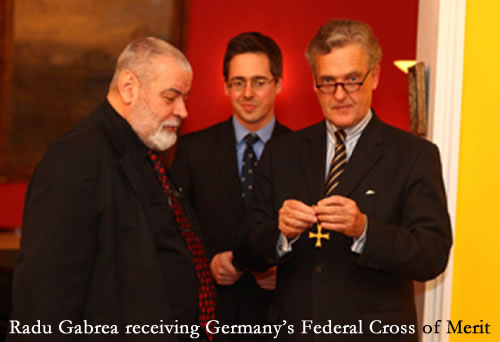 profession, that of a civil engineer to “run after shadows on the wall” as my father used to say, and become a film director. The adventures continued in my life: 1973, Ceausescu personally forbid my second feature film Beyond the Sands, which through many incredible adventures, was shown in Cannes et the Director’ Fortnight one year later. From Cannes I decided to leave and moved to West Germany.
profession, that of a civil engineer to “run after shadows on the wall” as my father used to say, and become a film director. The adventures continued in my life: 1973, Ceausescu personally forbid my second feature film Beyond the Sands, which through many incredible adventures, was shown in Cannes et the Director’ Fortnight one year later. From Cannes I decided to leave and moved to West Germany.
It was really here, during my three years of preparations for the film Fear Not, Jacob! that a deep interest in Jewish culture opened up in me. That was my first movie as an emigrant in Germany. I studied especially Gershom Sholem’s works about Jewish Mystic and Kabala, as well as Martin Buber’s and Rosenzweig’s works. The movie premiered at the First American Jewish Film Festival at the Kennedy Center in 1982, and then I traveled around the world with the film for almost a decade. We screened it in Moscow during the time of Gorbachev’s rule, when a revival of Jewish customs and culture among Russian Jews was taking hold.
CWB: Many of your films also deal with the consequences of living under a Communist regime. Do you consider yourself a “political” filmmaker? What particular meaning does this term hold for you today? 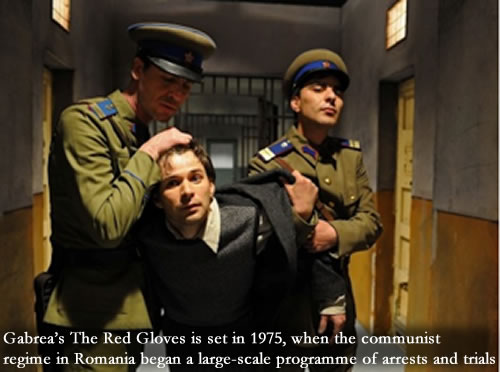 RG: Well, in the new Communist Romania of the early 60s, it was almost impossible, even unthinkable, to make free- thinking, political films. The cinema was completely dominated by the Communist state. I suppose we should have been happy to have the opportunity to work in the dream environment of those very modern new studios in Romania that were modeled after the Soviet studios. But instead we looked very enviously at our neighbors–Poland, Czechoslovakia, Hungary even Bulgaria–dreaming to make films like them. Ashes and Diamonds by Andrzej Wajda was a film which deeply impressed my generation. The lead character, played by Zbigniew Cybullski, was a kind of a secret hero for me and I decided to follow Wajda’s way. Since then, the theme of my films has been more or less the same: the individual confronted with history.
RG: Well, in the new Communist Romania of the early 60s, it was almost impossible, even unthinkable, to make free- thinking, political films. The cinema was completely dominated by the Communist state. I suppose we should have been happy to have the opportunity to work in the dream environment of those very modern new studios in Romania that were modeled after the Soviet studios. But instead we looked very enviously at our neighbors–Poland, Czechoslovakia, Hungary even Bulgaria–dreaming to make films like them. Ashes and Diamonds by Andrzej Wajda was a film which deeply impressed my generation. The lead character, played by Zbigniew Cybullski, was a kind of a secret hero for me and I decided to follow Wajda’s way. Since then, the theme of my films has been more or less the same: the individual confronted with history.
CWB: Tell us your assessment of the Romanian “New Wave” in cinema. How do compare these filmmakers with the young directors of your generation when you were starting out?
RG: I think “New Wave” is a today a brand. There are exceptionally talented young film directors have appeared with a new, revitalized “poor cinema”. For sure, the most important personality of this cinema, who put his stamp on most of these films and on the whole aesthetics of this cinema, is the screenwriter and director Razvan Radulescu. 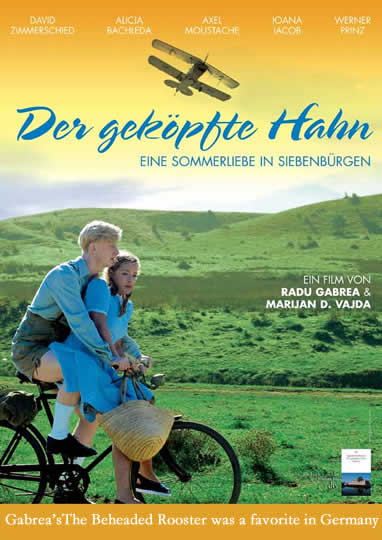
But it would be a grave mistake if we forgot the films of the 70s , those by the filmmakers Pintilie, Pita, Veroiu, Daneliuc and, Alexandru Tatos. And let’s not forget the very wonderful few films made by Mircea Saucan, a student of (the Russian director Alexander) Dovzhenko who is almost unknown, and whose only mistake was his desire to make a poetical cinema. That was too dangerous for the party functionaries, because what they didn’t understand, they feared the most. Therefore I think it’s totally inappropriate to discuss Romanian Cinema before 1989 using terms like “compromise”, or “cowardice,” as some have. To make any kind of worthwhile cinema in communist Romania was a life-jeopardizing activity.
But don’t forget: the new Romanian Cinema has to conquer and earn its public. Otherwise it will not survive. Audience attendance of Romanian films in our country is desperately small. For instance, only about 70,000 people went to the cinema in 2011, whereas in the same year Poland registered 11.8 million moviegoers.
Rene Clair once said that cinema is both a race car and a kind of poetry. If the poetry of this New Wave comes from its directors, then I may humbly say that the race car—its financing– is based on Romania’s cinema law and the independent film fund of 1999, which I helped develop when I was the president of The National Film Office. In implementing this law, I was in conflict with some of the big TV bosses and was falsely accused of criminal deeds. As I result, I lost my German citizenship. I do believe that more attention must be paid to the Romanian system of film financing .
CWB: Your wife, the theatre and film actress Victoria Cocias, has worked for you both in front of, and behind, the cameras. Tell us about your working relationship on set as actress and director, and also as co-producers. 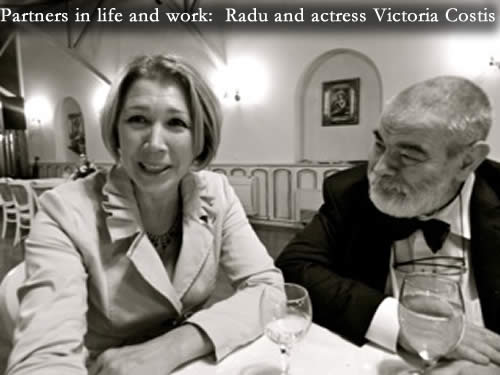 RG: Our relationship is a special and fortunate one. I help her however I can and to participate as much as I can in her work. She reads my screenplays, watches my film rushes and shares her opinions, which are always deeply helpful. She has incredible instincts. Unfortunately—and I regret this–we didn’t work together in many of my films. After making the Ceaucescu film, I discovered what a truly great film actress she is.
RG: Our relationship is a special and fortunate one. I help her however I can and to participate as much as I can in her work. She reads my screenplays, watches my film rushes and shares her opinions, which are always deeply helpful. She has incredible instincts. Unfortunately—and I regret this–we didn’t work together in many of my films. After making the Ceaucescu film, I discovered what a truly great film actress she is.
CWB: Why did you choose to tell the story of The Last Days of Ceaucescu as a docudrama, and not a straight drama?
RG: A straight drama, I think, is not yet possible for this story. It needs more distance in time. But the idea to make the film came to me after I saw a wonderful theatre performance by The Institute for Investigation of Political Crimes, in which Victoria and Constantin Cojocaru starred as Elena and Nicolae Ceaucescu.
CWB: How do you hope Romanians will react to Ceaucescu — both the older generation, and newer audiences who are too young to remember?
RG: I expect very different reactions, from strong sympathy to hate; from disapproval to a very positive appreciation. But the theme is a tough one for everyone.
As far as international audiences, I think the film deserves to be shown as a World Premiere in Los Angeles. God help me to make that happen!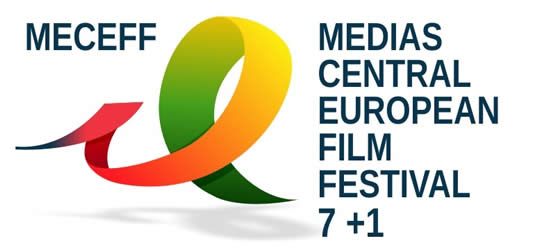
CWB: Which Hollywood films and filmmakers have influenced you the most?
RG: It’s a hard question! The youngsters of the past that are now about my own age have been a big influence–Coppola, Scorsese, Cimino, Spielberg and Polanski during his time in Hollywood. Also Brian de Palma, Zemeckis, Jarmush, Cassavetes, the Cohen Brothers, and the grand old masters like Hitchcock and Billy Wilder.
One of the truly greatest “movie men” in history was William Shakespeare. His stories were so popular that when they performed them at The Globe the boats crossing the Thames even reduced their price for the “groundlings” filling the parterre of the theatre. I’ve always wished that American commercial cinema could become “serious” entertainment the way his did, but unfortunately that is largely still a wish.
CWB: Finally, what is it that drives you to keep making movies at an age, 74, when most filmmakers have long retired?
RG: What else can I do? If I had my way, I would shoot without interruption for hours, days and months. I believe true passion is ageless.

